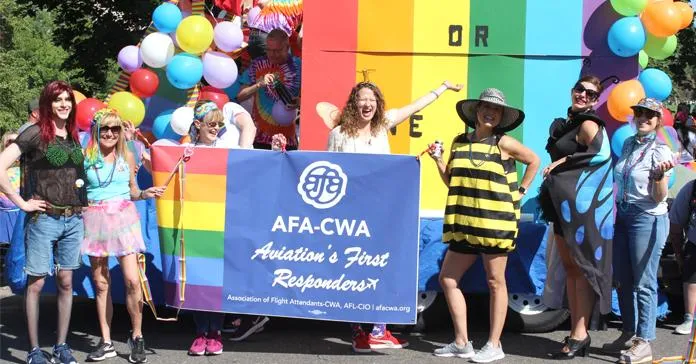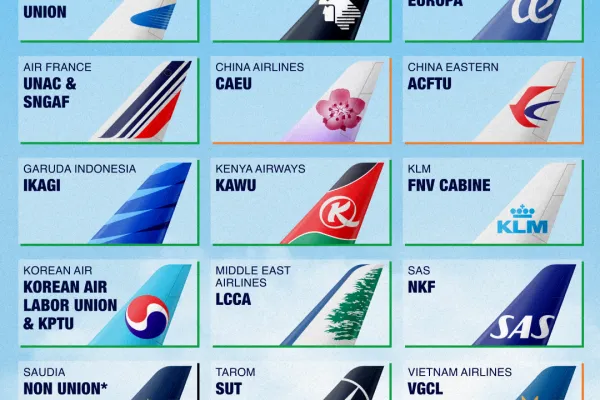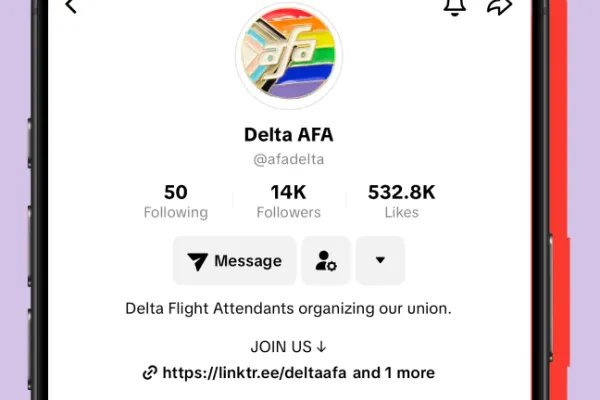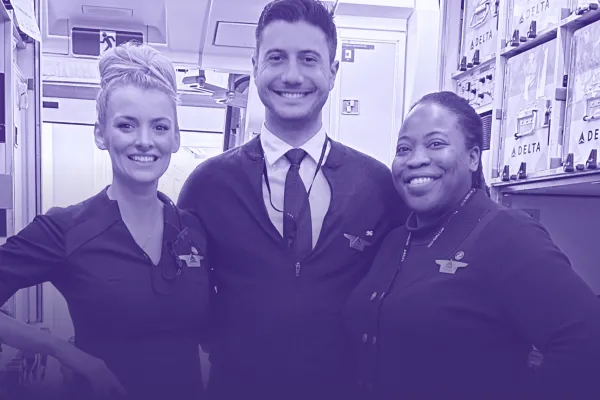PRIDE Month: AFA’s Fight to Win Domestic Partner Benefits for Flight Attendants

Today, airlines wave the Rainbow Flag proudly during the month of June. But that wasn’t always the case. LGBTQ+ rights have come a long way in a very short time. Our Flight Attendant union fought and won domestic partner benefits in the late 90s.
ISSUE
Prior to the Supreme Court’s ruling in Obergefell v Hodges in 2015, gays and lesbians were denied over 1,000 different federal- based benefits associated with marriage, including spousal healthcare options, because their relationships were not recognized by the federal government. This left gay and lesbian employees subject to voluntary management recognition of their relationships and benefits, negotiating spousal benefits during contract talks or lobbying individual States and/or cities to enact laws to provide access to such benefits.
AFA’s Constitution and Bylaws, which was adopted in 1973, included a commitment to non-discrimination based on sexual orientation. Management pushed back at the bargaining table and refused to entertain provisions that would provide equitable benefits to our LGBTQ members. While Fortune 500 corporations had begun to offer Equal Employment Polices and Domestic Partner Benefits, the airlines had not followed suit. Management claimed they were concerned about increased health care costs and a competitive disadvantage if they were to offer benefits when other airlines didn’t. No one wanted to be the first airline to offer such benefits. In addition, management argued that Domestic Partner Benefits were expensive special rights that benefited a minority group who “choose” their lifestyle. During the 1990’s there was a wave of anti-same-sex marriage amendments enacted through legislation and voter initiatives across the country.
Then, in 1996, the city of San Francisco became the first jurisdiction in the nation to pass an Equal Benefits Ordinance. The law required all companies doing business with the city to offer the same benefits to unmarried employees in domestic partner relationships -- including gay and lesbian couples -- as they do to married couples.
United Airlines, along with the Air Transport Association, the management lobbying group representing 21 other airlines, filed suit against the city of San Francisco in May of 1997 arguing that airlines are nationwide businesses regulated by federal law and should not be affected by local statutes.
At the time, the United AFA MEC was also in Section 6 negotiations. Flight Attendants had voted down an initial tentative agreement and were angry with management’s positions at the negotiating table. Flight Attendants were energized and ready to mobilize. But because of limitations within the Railway Labor Act, which governs airline labor negotiations and representation, Flight Attendants could not take any direct action that would cause financial harm to the airline.
ACTION
United AFA’s SFO Council 11 Communications Co-Chairs Beth Skrondal and Stan Kiino were approached by Jeff Sheehy, one of three authors of the Ordinance and the President of the Harvey Milk Democratic Club to form an alliance against United’s discriminatory stance. They also allied with LGBT Labor Constituency group Pride at Work’s leader Howard Wallace and the Human Rights Campaign (HRC). Sheehy’s goal was to isolate United and publicly shame them so that other firms in other industries would not join the lawsuit. Together, they could pressure management to provide Domestic Partner benefits and settle a new contract with improved wages and work rules.
Their first action occurred on June 20, 1997 at the San Francisco Gay Pride Parade. AFA members wearing the trademark green CHAOS t-shirts marched and passed out 10,000 leaflets asking “Is United really gay-friendly?” This was particularly impactful due to United’s sponsorship of a float in the parade.
Tactics at this point began to shift to civil disobedience. On July 10, 1997 the coalition demonstrated outside of United’s downtown ticket office AFA members wearing the trademark green CHAOS™ t-shirts marched and passed out 10,000 leaflets asking, “Is United really gay-friendly?” calling for a contract and domestic partner benefits. While AFA members and allies rallied outside with CHAOS™ t-shirts and signs, non-Flight Attendant coalition partners entered the office, cut up their frequent flyer cards, blocked entrances and were arrested.
Some advocated for a public boycott of United. Because of the limitations of the RLA, AFA couldn’t join the boycott call. HRC stepped in and called for a worldwide consumer boycott. Additional protests were announced where Flight Attendants would legally rally but not participate in civil disobedience. The new coalition energized Flight Attendants and increased membership turnout for events.
Soon after the initial ticket office protest, AFA and United reached a tentative agreement on a new contract which provided wage increases and work rule improvements but did not include domestic partner benefits. This second tentative agreement was narrowly approved by the membership taking contract negotiations out of the battle for domestic partnership benefits.
But behind the scenes, the pressure seemed to be having an effect.
On September 24, 1997, following the contract ratification, United AFA MEC President Kevin Lum received a call from Director of Labor Relations- Inflight Frank Colosi on behalf of CEO Gerald Greenwald. Colosi informed Lum that they had received word that a competitor was about to offer domestic partner benefits. Greenwald wanted to offer comparable benefits within hours, including medical, dental and pass benefits. He asked whether AFA would be open to such benefits. Lum enthusiastically said yes and suggested United go first. He never received a response to his suggestion.
But the competitor didn’t offer benefits and United continued to pursue their challenge in court. The United AFA MEC filed a grievance on March 5 claiming discrimination based on marital status and sexual orientation to apply additional pressure on United management.
Colosi filed a declaration and deposition in support of United’s motion for a preliminary judgement in the case in July and September of 1998. He claimed United could not provide the benefits to SFO based crews because it would damage the relationship with AFA and create inequity within the ranks. The city’s attorney reached out to AFA MEC President Lum. Lum worked with AFA Legal Counsel and filed a legal declaration in the case on December 7, 1998. In his declaration, he recounted his conversation with Colosi over one year before which showed that not only could United provide these benefits but had been prepared to enact them within hours. Lum’s sworn declaration contradicted United’s position in their lawsuit.
The city of San Francisco Board of Supervisors upped the ante. On December 15, 1998 just 10 days before Christmas, during one of the busiest travel seasons of the year, it officially endorsed the boycott campaign. They urged the public to support the boycott and pledged that no city employees would be allowed to fly United to conduct official business.
RESULT
The case continued to drag through the courts and on May 28, 1999, Ninth Circuit Court judge Claudia Wilken gave the airlines a partial victory, saying they did not have to offer such economic benefits as pensions or health insurance. But she said they did have to offer to their San Francisco employees such noneconomic benefits as bereavement or medical leave and flight discounts. Not satisfied with a partial victory, the airlines appealed.
On July 29, 1999, Judges Michael Hawkins and Susan Graber of the U.S. Court of Appeals in San Francisco refused to grant United and other carriers a further delay in providing the benefits ordered by Wilken.
The next day, July 30, 1999, United announced it would provide full domestic partner benefits, including health and pension coverage, to LGBTQ employees and retirees worldwide. Additionally, unmarried heterosexual couples, who had the option to marry, would get noneconomic benefits such as bereavement leave. Within days, both American Airlines and Delta Air Lines followed suit and offered domestic partner benefits for their employees as well. Over the course of the next several years, Domestic Partner benefits became the standard throughout the airline industry.
Union Flight Attendants are an integral part of the Delta Global Network.
Can management see what apps are on your phone?



